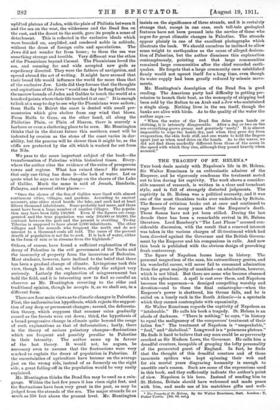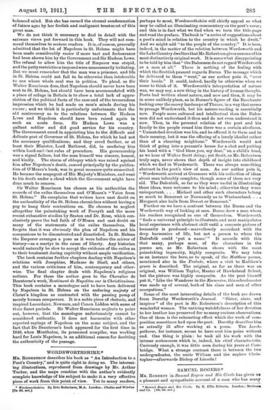THE TRAGEDY OF ST. HELENA.*
Tins book deals mainly with Napoleon's life in St. Helena. Sir Walter Runciman is an enthusiastic admirer of the Emperor, and he vigorously condemns the treatment meted out to him during his captivity. The work shows a consider- able amount of research, is written in a clear and trenchant style, and is full of strangely distorted judgments. The captivity in St. Helena was a political necessity, and it was one of the most thankless tasks ever undertaken by Britain. The flames of criticism broke out at once and continued to rage fiercely for many years after the Emperor's death. These flames have not yet been stilled. During the last decade there has been a remarkable revival in St. Helena literature. Lord Rosebery's " The Last Phase " aroused con- siderable discussion, with the result that a renewed interest was taken in the various charges of ill-treatment which had been directed against the Governor and the British Govern- ment by the Emperor and his companions in exile. And now this book is published with the obvious design of provoking fresh controversy.
The figure of Napoleon looms large in history. The personal magnetism of the man, his extraordinary genius, and his wonderful career, will never fail to command admiration from the great majority of mankind—an admiration, however, which is not blind. But there are some who become obsessed with the splendour. A spell is cast over them, and Napoleon becomes the superman—a demigod compelling worship and devotion—and to these the final catastrophe—when the Emperor's power is shattered, his throne falls, and he is exiled on a lonely rock in the South Atlantic—is a spectacle which they cannot contemplate with equanimity.
Sir Walter Runciman regards the captivity of Napoleon as "intolerable." He calls his book a tragedy. St. Helena is an abode of darkness. " There is nothing," he says, " in history to equal the malignancy of the conquerors' treatment of their fallen foe." The treatment of Napoleon is "unspeakable," "foul," and " diabolical." Longwood is a "poisonous plateau." He finds it hard to believe that any man could be so perversely crooked as Sir Hudson Lowe, the Governor. He calls him a dreadful creature, incapable of grasping the lofty personality of the persecuted guest of England. In fact, he finds that the thought of this dreadful creature and of those incarnate spiders who kept spinning their web and for six mortal years disgracing humanity is enough to unsettle one's reason. Such are some of the expressions used in this book, and they sufficiently indicate the author's point of view. Napoleon is his hero. Instead of sending him to St. Helena, Britain should have welcomed and made peace with him, and made use of his matchless gifts and well-
• The Tragedy of St. Helena. By Sir Walter Buncinian, Bart. London : Fisher Malvin. [10s. 6d. net
balanced mind. But she has earned the eternal condemnation of fatale ages by her foolish and malignant treatment of this great man.
We do not think it necessary to deal in detail with the extreme views put forward in this book. They will not com- mend themselves to serious readers. It is, of course, generally admitted that the lot of Napoleon in St. Helena might have been made considerably easier if more tact and forbearance had been shown him by the Government and Sir Hudson Lowe. The refusal to allow him the title of Emperor was stupid, and the petty restrictions imposedwere unnecessarily irritating. But we must remember that the man was a prisoner, and life in St. Helena could not fail to be otherwise than intolerable to one whose whole soul was in politics. To plead, as Sir Walter Runciman does, that Napoleon should never have been sent to St. Helena, but should have been accommodated with a place of refuge in Britain is to show a total lack of appre- ciation of the political facts of the case and of the tremendous impression which he had made on men's minds during his career ; and we think it is particularly unfortunate that the old controversy as to the relations between Sir Hudson Lowe and Napoleon should have been raised again in such an acute form. Sir Hudson Lowe was a gallant soldier and did good service for his country. The Government erred in appointing him to the difficult and delicate post of Governor of St. Helena, for which he had not the necessary qualifications; and they erred further, or at least their Minister, Lord Bathurst, did, in confining him within hard-and-fast rules of procedure. His governorship was a signal failure, but the man himself was sincere, honest, and kindly. The storm of obloquy which was raised against him after Napoleon's death, caused principally by the publica- tion of O'Meara's book, was in great measure quite unmerited. He became the scapegoat of His Majesty's Ministers, and went to his death under a cloud which the Government might have done much to remove.
Sir Walter Runciman has chosen as his authorities the records of the exiles themselves and O'Meara's " Voice from St. Helena." He complains that writers have cast doubt on the authenticity of the St. Helena chroniclers without having a peg to hang their contentions on. He chooses to neglect altogether the painstaking work of Forsyth and the more recent exhaustive studies by Seaton and Dr. Rose, which con- clusively prove the bad faith of O'Meara and cast doubt on many of the statements of the exiles themselves. He forgets that it was obviously the plan of Napoleon and his companions to be discontented and dissatisfied. In St. Helena the Emperor arranges a pose as it were before the mirror of history—as a martyr in the cause of liberty. Any historian would naturally be slow to accept the evidence of the exiles as to their treatment during captivity without ample verification.
The book contains further chapters dealing with Napoleon's relations with Josephine, Madame de Staa, and others, and the various criticisms of him, contemporary- and other- wise. The final chapter deals with Napoleon's religious notions. For these the author goes to the Chevalier de Beanterne's work,. Sentiment de Napoleon sur le Christianisme. This book contains a monologue said to have been delivered by Napoleon in St. Helena on the enduring majesty of Christ's kingdom as contrasted with the passing pomp of merely human conquerors. It is a noble piece of rhetoric, and inspired Lacordaire, Newman, and Canon Liddon with some of their finest periods.- Sir Walter Runciman neglects to point out, however, that the monologue unfortunately cannot be considered authentic. It does not harmonize with other reported sayings of Napoleon on the same subject, and the fact that De Beauterne's book appeared for the first time in 1840, when Montholon, its presumed compiler, was working bard for Louis Napoleon, is an additional reason for doubting the authenticity of the passage.



































 Previous page
Previous page